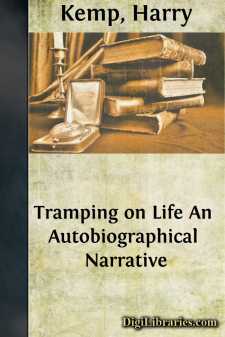Non-Classifiable
- Non-Classifiable 1768
Non-Classifiable Books
Sort by:
by:
Emily Burbank
FOREWORD Woman as Decoration is intended as a sequel to The Art of Interior Decoration (Grace Wood and Emily Burbank). Having assisted in setting the stage for woman, the next logical step is the consideration of woman, herself, as an important factor in the decorative scheme of any setting,—the vital spark to animate all interior decoration, private or public. The book in hand is intended as a brief...
more...
by:
Harry Kemp
TRAMPING ON LIFE Now I am writing these things just as I was told them by my grandmother. For I have utterly no remembrance of my mother. Consumption ran in her family. And bearing and giving birth to me woke the inherited weakness in her. She was not even strong enough to suckle me. I was born in the early eighties, in Mornington, Ohio, in a section of that great, steel-manufacturing city which was...
more...
by:
Ethel M. Mairet
WOOL SILK COTTON AND LINEN WOOLS are of various kinds:— Highland, Welsh and Irish wools are from small sheep, not far removed from the wild state, with irregular short stapled fleeces. Forest or Mountain sheep (Herdwick, Exmoor, Cheviot, Blackfaced, Limestone) have better wool, especially the Cheviot, which is very thick and good for milling. Ancient Upland, such as South Down, are smaller sheep than...
more...
CHAPTER I. The Monroe Doctrine In 1815 the world found peace after twenty-two years of continual war. In the forests of Canada and the pampas of South America, throughout all the countries of Europe, over the plains of Russia and the hills of Palestine, men and women had known what war was and had prayed that its horrors might never return. In even the most autocratic states subjects and rulers were...
more...
by:
John Masefield
THE OLD FRONT LINE This description of the old front line, as it was when the Battle of the Somme began, may some day be of use. All wars end; even this war will some day end, and the ruins will be rebuilt and the field full of death will grow food, and all this frontier of trouble will be forgotten. When the trenches are filled in, and the plough has gone over them, the ground will not long keep the...
more...
by:
Grace Greenwood
MABEL HOWARD AND HER PET. After all, I think I had more real delight in the noble public parks and gardens of London than in palaces and cathedrals They were all wonders and novelties to me—for, to our misfortune and discredit,—we have nothing of the kind in our country. To see the poor little public squares in our towns and cities, where a few stunted trees seem huddled together, as though...
more...
by:
Arthur Dimock
PREFACE. The MSS. relating to St. Paul's are deficient in regard to the earlier periods, but become gradually more complete as time progresses. They have been published or quoted, probably, more extensively than those belonging to any other religious foundation in this country, unless it be such communities as St. Alban's, which have attracted the continued attention of the editors working...
more...
by:
Edward Jenner
AN INQUIRY, &c. &c. The deviation of Man from the state in which he was originally placed by Nature seems to have proved to him a prolific source of Diseases. From the love of splendour, from the indulgences of luxury, and from his fondness for amusement, he has familiarised himself with a great number of animals, which may not originally have been intended for his associates. The Wolf,...
more...
CHAPTER I ART AND RITUAL The title of this book may strike the reader as strange and even dissonant. What have art and ritual to do together? The ritualist is, to the modern mind, a man concerned perhaps unduly with fixed forms and ceremonies, with carrying out the rigidly prescribed ordinances of a church or sect. The artist, on the other hand, we think of as free in thought and untrammelled by...
more...
by:
Frank Sidgwick
PREFACE Of making selections of ballads there is no end. As a subject for the editor, they seem to be only less popular than Shakespeare, and every year sees a fresh output. But of late there has sprung up a custom of confusing the old with the new, the genuine with the imitation; and the products of civilised days, ‘ballads’ by courtesy or convention, are set beside the rugged and hard-featured...
more...











